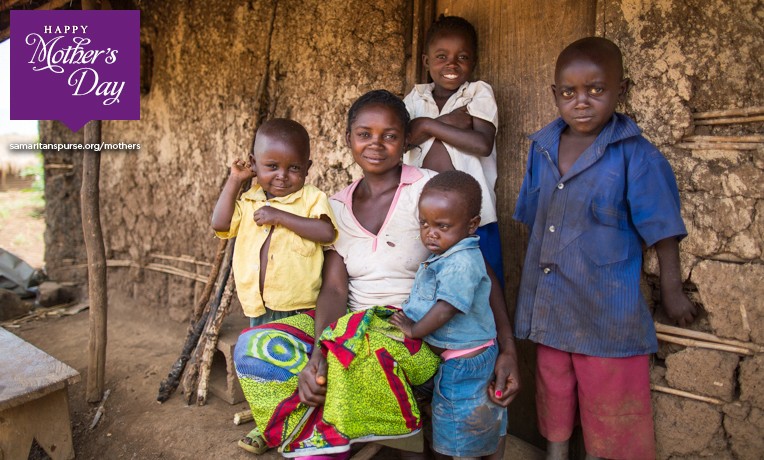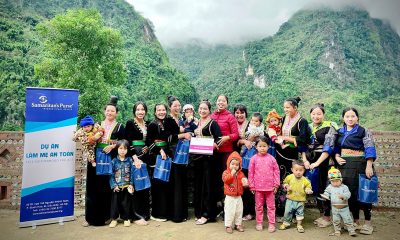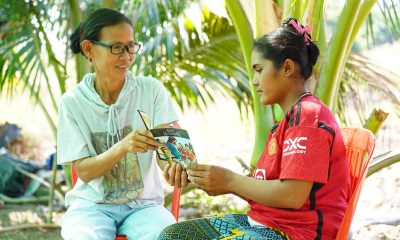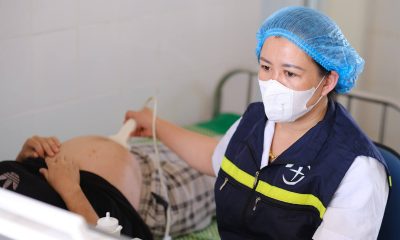In a country ravaged by war, mothers receive training to care for their children
 Being a mother is difficult. It’s especially hard in a country torn by war, when the need to survive overcomes everything else. Running from rebels who burn homes and kill innocent people has been the reality for most Congolese people for the past 20 years.
Being a mother is difficult. It’s especially hard in a country torn by war, when the need to survive overcomes everything else. Running from rebels who burn homes and kill innocent people has been the reality for most Congolese people for the past 20 years.
“I believe that displacement has greatly affected people’s health,” said Alain Mula, the Samaritan’s Purse Nutrition and Maternal Education Development program supervisor. “For example, there are people who were in a good environment; they had their homes. But then when they came back, they had to start all over again.”
Perhaps the most innocent group left struggling for life in the midst of this senseless war is young children.

Decades of war have created great challenges for women in the Congo
In the afternoon, I visited the malnourished children’s ward at Nyankunde’s CME Hospital. Babies—whose size suggested they were much younger than they were—sat hooked to feeding tubes as their mothers breastfed younger siblings. One 3-year-old boy’s face was swollen, and he emitted a tiny cough from deep in his lungs. His malnutrition had led to tuberculosis. I realized that malnutrition is a complicated issue.
Helping these people is not just about showing mothers different farming techniques or providing them with seeds. It’s also not just about giving children therapeutic milk or other supplemental food.

Agriculture programs provide mothers with nutritious food for their children.
All of these methods help the child, but there’s an important part missing. In the Congo, many women are completely uneducated. They often begin having babies as teenagers and continue having them often until their husbands leave them. They must take care of their children, but no one has taught them how.
That’s where the third program that I saw came into play.
The next day, I visited a care group. Several mothers had been elected by their peers to be trained to teach their community. These women learn how to care for their children by making sure they’re eating the right amount. They also learn to look for signs that their children are sick so that they can visit the hospital before their condition worsens.
On the day I visited, the women talked about diarrhea. They played games and showed charts to explain the condition, how it spreads, and what to do.

Community leaders trained by Samaritan’s Purse educate mothers about health and hygiene practices.
The war has kept people from doing simple tasks, such as caring for their children. When you’re running for your life, making sure your baby receives enough protein can become less important. But with the help of this Samaritan’s Purse program, mothers are relearning skills that have been lost in the past 20 years.
Many of them now have the knowledge to care for their own children rather than taking them to the hospital. And when the need is too great, mothers now know to take their children to a hospital before it’s too late.
“It has created this sense of self-efficiency where the person knows that they can take care of their own health and of their child’s health,” said Baraka Muvuka, a Samaritan’s Purse public health intern. “Maybe before they relied more on the health care providers, on the doctors, nurses, but now they know they can prevent much of it in the community setting on their own because of the health education that they’re receiving.”

Samaritan’s Purse programs emphasize the hope of the Gospel.
“When I’m teaching the women, I emphasize God’s love for us, and also I ask them to love God in return,” said Boline Pascaline, a leader mother.
As I left the malnutrition ward at the hospital, I felt incredibly sad. I knew it was unlikely that all of the children in there would survive. For some, it was too late.
But as I left the educational program, I felt hopeful. The babies sitting on mothers’ laps there were safe. Their mothers had learned to care for them. In a place where the focus has been solely on survival, these women were remembering their roles as mothers.





